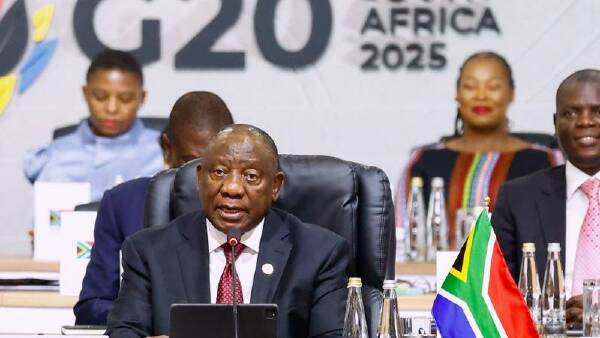
A summit of Group of 20 leaders in Johannesburg, South Africa, concluded with the adoption of a declaration addressing the climate crisis and various global challenges. This significant outcome occurred without input from the United States, leading a White House official to label the situation as “shameful.” The declaration, which includes language that has faced opposition from Washington, has been described by a spokesperson for South African President Cyril Ramaphosa as one that “can’t be renegotiated.”
The summit, held from September 1 to 3, 2023, showcased the culmination of a year-long effort towards consensus on pressing international issues. Ramaphosa highlighted the “overwhelming consensus” among the participating nations regarding the importance of the declaration, which emphasizes the urgency of addressing climate change and the necessity for better adaptation strategies.
According to sources familiar with the discussions, G20 envoys drafted the declaration without US involvement, a move that reflects existing tensions between Pretoria and the Trump administration. The document notably stresses the severity of climate change, advocates for ambitious renewable energy targets, and acknowledges the debt burdens faced by developing nations. These themes are in stark contrast to Trump’s skepticism regarding climate science and his administration’s stance against similar references in international agreements.
In his opening remarks, Ramaphosa expressed gratitude to all delegations for their collaborative efforts in producing what he termed a “worthy G20 outcome document.” He emphasized the need to maintain the integrity and significance of the first African presidency of the G20, stating, “We should not allow anything to diminish the value, the stature and the impact of this presidency.”
The absence of US officials at the summit was attributed to Trump’s claims of alleged persecution of the white minority by South Africa’s Black majority government, an assertion that has been widely discredited. The US president has also rejected the summit’s agenda focused on solidarity and support for developing nations, particularly in their efforts to tackle climate challenges and manage debt.
The US is slated to host the G20 in 2026, and Ramaphosa commented on the unusual handover of the rotating presidency to an “empty chair.” The South African presidency has declined a US offer to send a charge d’affaires for the transition, further illustrating the diplomatic strains created by the boycott.
The G20 summit has thus become a pivotal moment, not only for climate policy but also for international relations, highlighting the complex dynamics of global governance in the face of differing national priorities.







